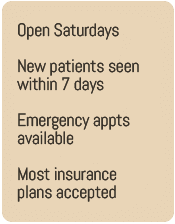How to Stay Healthy at 50 and Up
If you are in your 50s, now is the time to think about how you want to spend your twilight years. What you do now will affect your health over the next 20, 30, 40 years. Taking a careful look at your daily lifestyle habits and establishing a relationship with the right primary care physician are keys to staying healthy at 50 and beyond.
Tuning into your health as you age
As you mature, new ailments are likely to arise. Consequently, a broader array of diagnostic tests may be in your future. Patients generally undergo routine lab testing yearly to ensure stable numbers and identify any new concerns. If you arrive for your annual exam with a new complaint, your physician may order additional lab work, imaging or other diagnostic procedures. Testing is an excellent first step to ruling out possible conditions and shedding light on any emerging health concerns.
Beyond the lab numbers, a good primary care physician will listen to your complaints and endeavor to understand your wellness and lifestyle goals. Each patient is an individual who should have a voice in their own healthcare.
By considering all the test results and applying them to your life, your doctor can provide treatment recommendations and advice based on what is important to you.
Common conditions for patients age 50+
As we age, it is not unusual to acquire a myriad of new medical conditions that take time and attention to properly diagnose and manage. According to AARP, common conditions to watch for as you age include:
- High Blood Pressure – A major risk factor for heart disease and stroke, high blood pressure is increasingly common with age. As arteries get stiffer, blood flow can be restricted, causing blood pressure to go up. This can be true even for people with heart-healthy habits who feel fine.

- High cholesterol – Characterized by plaque buildup inside the blood vessels, high cholesterol is another common condition among an aging population. The plaque can break loose and cause a blog clot, heart attack or stroke.
- Diabetes – Those in middle age have the highest risk of developing type 2 diabetes, characterized by elevated blood glucose levels (or blood sugar). Left untreated, diabetes can lead to other health conditions, such as kidney disease, vision loss and heart disease – so regular screenings are critical. Learn more about how to control diabetes.
- Osteoarthritis – Arthritis shows up as pain and stiffness in the joints due to wear and tear of the cartilage that provides cushion between bones. Treatment can include anti-inflammatory medication, injections and physical therapy. Your doctor may even recommend increased physical activity to help lubricate the joints.
- Osteoporosis – The bones of the body can become porous with age, leaving them weak, brittle and more susceptible to breaks. Women in particular experience this loss in bone density following menopause. Weight-bearing exercises and calcium and vitamin D intake can help prevent this degenerative condition. Learn about infusion treatment for osteoporosis.
- Cancer – Aging is the most significant risk factor for cancer, so regular screenings are essential starting in your 50s. Mammograms for women, prostate screenings for men, and colon cancer screenings are necessary for adults over 50. Learn more about cancer prevention.
- Anxiety/depression – Midlife often has many stressors, which can affect your mental health. According to the CDC, about 20 percent of people age 55 or older experience some type of mental health concern. Anxiety and depression are among the most common. Be sure to discuss not only your physical health but also your mood and emotional health when you see your primary care physician.
Other conditions that may emerge as you approach middle age include thyroid abnormalities, chronic kidney disease, liver disease and sleep apnea, to name a few. Mobility, mental acuity and medication management are other issues to monitor in your more advanced years.
To stay healthy at 50 and beyond, it’s important to identify these conditions, along with your individual risk factors. Your weight, diet, activity level, tobacco and alcohol use and family medical history all play into your longevity. Making lifestyle adjustments and staying out in front of these issues will help you maintain your health and quality of life.

Primary care to stay healthy at 50 and up
It’s so important as you hit middle age to have a trusted primary care physician in your corner – one who understands healthy aging and is committed to delivering personalized care. A recent study in the Journal of the American Geriatrics Society found that most primary care providers agree that older patients “require a different approach to care than younger patients.” Yet, only 50% of doctors say they actually customize care for patients in their 50s and older. Furthermore, only 36% of doctors surveyed say they ask their older patients what matters to them.
Talk with your doctor to better understand his or her approach to treating patients as they progress into their senior years. Make sure you agree with your provider’s philosophy, so you know you have the right medical partner in your health care journey.
Interested in learning more about personalized primary care? Make an appointment with our primary care physician today!





